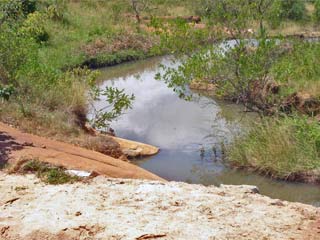Yongoni Water Project
Type: Weir (sand-dam)
Expected capacity: 2 million litres
Beneficiaries: 2,000 people - 300 men, 500 women, 1,200 youth and children.
Location:The Yongoni Water Project is situated at Yongoni Village, Kakuyuni sub-location, Kalama Location, Kalama Division, Machakos District (.35 kms south of Machakos town). The area is surrounded by four hills - Kilima Nzalu, Kivu and Mbevo
Total Cost: $5,250 plus the local community's contribution.
Sponsor: TheWaterProject.org supporters
Status: Funded - Under Construction
Project Summary:

Why a sand dam makes sense:
The Yongoni area receives annual rainfall of about 600-900 mm (23-35 in) per year and is generally warm. The available rivers, like the one pictured here, are mostly seasonal and dry up during the humid season. This leaves the communities in dire need of water. During these long dry spells, people must walk more than 3km in search of water.
Building a sand dam (weir) will capture huge amounts of water that normally flows past the community in Yongoni. By storing the rainwater that does fall, ground water will increase, crops will become
more sustainable, and people will have a source of water for a much longer period of the year.
How it will relieve hunger:
Once the sand dam is in place the community will be able to expand their current agriculture activities. Food crops such as maize, beans, cowpeas, millet, pigeon peas, wheat, and bananas as well as
root crops such as Cassav and sweet potatoes and fruits like water melon, avocado, pawpaw and oranges will grow more readily in the soils surrounding the dam.
How it improves livelihoods:
When women and girls are busy gathering water during a large part of their day, they are unable to participate in other activities that could support and improve their livelihood.
Currently, community members make ropes, weave baskets, make table clothes, sell livestock and perform casual labor. With better access to clean water, these activities will be expanded. Other development programs
in the area, such as micro finance, will allow entirely new businesses to develop.
Other Goals:
The community has identified the top ten problems it faces regularly. Access to water is number one. Others ranked by impact are poverty, lack of knowledge, and HIV/AIDS. Each of these issues can
be linked to access to clean water.
Poverty: Poverty is worsened by poor productivity. Without one's health, work is impossible. Good health requires clean water.
Education: Education is only possible when students can attend school. When gathering water preoccupies so much of the day, no one is available to teach or to be taught.
HIV/AIDS: HIV/AIDS is a horrible disease the destroys the immune system causing even the smallest illness or infection to have grave consequences. Dirty water is filled with disease. To effectively treat HIV/AIDS, you must have access to clean water and proper sanitation.
It is clear that improving and saving lives in Yongoni begins with water!
Join Us. Donate. Make a Difference. Tell others.